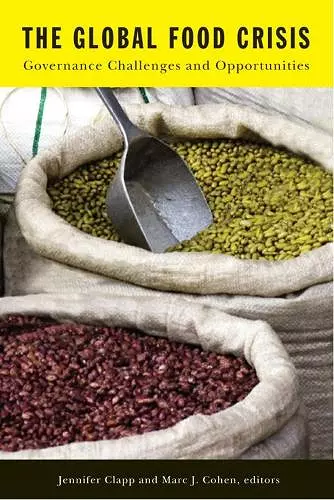The Global Food Crisis
Governance Challenges and Opportunities
Jennifer Clapp editor Marc J Cohen editor
Format:Paperback
Publisher:Wilfrid Laurier University Press
Published:30th Sep '09
Currently unavailable, and unfortunately no date known when it will be back

The global food crisis is a stark reminder of the fragility of the global food system. The Global Food Crisis: Governance Challenges and Opportunities captures the debate about how to go forward and examines the implications of the crisis for food security in the world's poorest countries, both for the global environment and for the global rules and institutions that govern food and agriculture.
In this volume, policy-makers and scholars assess the causes and consequences of the most recent food price volatility and examine the associated governance challenges and opportunities, including short-term emergency responses, the ecological dimensions of the crisis, and the longer-term goal of building sustainable global food systems. The recommendations include vastly increasing public investment in small-farm agriculture; reforming global food aid and food research institutions; establishing fairer international agricultural trade rules; promoting sustainable agricultural methods; placing agriculture higher on the post-Kyoto climate change agenda; revamping biofuel policies; and enhancing international agricultural policy-making.
Co-published with the Centre for International Governance Innovation
``The Global Food Crisis amasses a nice set of thoughtful papers by respected authorities. Collectively, they offer useful insights on the genesis and implications of the global food crisis that began in late 2006 and exploded on the world stage in 2008. This book especially highlights underlying governance questions that are fundamental but far too often overlooked.'' -- Christopher B. Barrett, Director, African Food Security and Natural Resources Management Program, Cornell University -- 09/2009
``[The] sixteen chapters [are] grouped loosely into sections on causes, immediate governance challenges and proposed solutions, longer-term solutions and problems, and strategies to promote a future sustainable food system.... [B]y including 2008 data and analysis, it is a timely addition to a collection on global food systems and security...a good complement to single-authored books on the food crisis.'' -- J.M. Deutsch, CUNY Kingsborough Community College -- CHOICE, April 2010
``By focusing on issues which have been addressed insufficiently in the major international food and agricultural institutions [this book makes] a compelling case for establishing a democratic system of global governance which would ensure food security for all.'' -- D.J. Shaw -- Development Policy Review, 29 (2), 2011
``The Global Food Crisis...is a timely and comprehensive study of the recent global food crisis.... The editors purposefully (and refreshingly) ensure that throughout the book all sides of the debate receive due consideration.... A distinctive asset of the book is the balance between contributions from practitioners and academics. The mix of case studies, policy report-styled summaries and theoretically inclined contributions provides insights nto the challenges of agriculture and food governance at two levels: on the ground with the practitioner and at a broader level of systemic analysis provided by scholars.... The book fills a significant void in the literature by providing a transdisciplinary contribution examining the linkages between governance institutions, modes of agricultural production, food assistance policies, biotechnology, climate change and hunger eradication. As such, the book would be of considerable interest to scholars of international political economy, global governance, environmental studies, development, health and public policy. Scholars of contemporary global governance would benefit significantly from this book as it makes a most welcome addition to the study of global governance by bringing agriculture and food to the forefront of governance debates. For far too long, agriculture and food have been pushed to the margins of global governance studies, and here this book provides a pioneering rectification.'' -- Matias E. Margulis, McMaster University -- European Journal of Risk Regulation, 1/2010
``This fine collection of essays puts the food crisis into the ecological, social, political, global and institutional context that the debate so urgently needs.'' -- Raj Patel, author of Stuffed and Starved: The Hidden Battle for the WorldFood System -- 200909
``A reader looking for a coherent set of governance principles and strategies to guide us through the food crisis will be disappointed, but the book is packed with plenty of suggestions that a reader can hoose from in deciding where to begin. This speaks to the vastness of the problem that faces the world today; it is multifaceted and intractable, with long- and short-term causes, each of which requires an adequate response. Clapp and Cohen's volume does the important job of illuminating much of the structure of this vast problem, with a few specific proposals--such as urban agriculture, reforming the Food Aid Convention, reforming U.S. biofuel policy--sprinkled in. Most importantly, the book highlights the deeper instabilities of our food system at a time when some may be lulled by the end of the 2008 crisis, with prices returning to reasonable levels for the time being. Clapp and Cohen emphasize the urgent need to begin addressing the structure of our global food system if we are to prevent another crisis and ensure food security for developing countries in the 21st century.'' -- Lisa Guo and David Rojas -- Yale Human Rights and Development L.J., Volume 13, 201010
ISBN: 9781554581924
Dimensions: 229mm x 152mm x 25mm
Weight: 450g
288 pages